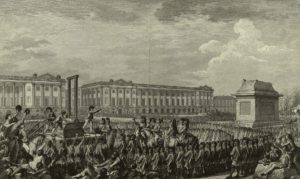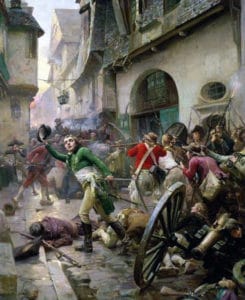
France had declared war on Great Britain and the Dutch Republic in November 1792 and did the same on Spain in March 1793; in the spring of 1793, Austria and Prussia invaded France; in March, France created a “sister republic” in the “Republic of Mainz“.
Also in March 1793, the civil war of the Vendée against Paris started, evoked by both the Civil Constitution of the Clergy of 1790 and the nationwide army conscription early 1793; elsewhere in France rebellion was brewing too. A factionalist feud in the National Convention, smoldering ever since October 1791, came to a climax with the group of the ‘Girondins’ on 2 June 1793 being forced to resign and leave the Convention. The counter-revolution, begun in March 1793 in the Vendée, by July had spread to Brittany, Normandy, Bordeaux, Marseilles, Toulon, and Lyon. Paris’ Convention government between October and December 1793 with brutal measures managed to subdue most internal uprisings, at the cost of tens of thousands of lives. Some historians consider the civil war to have lasted until 1796 with a toll of possibly 450,000 lives. By the end of 1793 the allies had been driven from France. France in February 1794 abolished slavery in its American colonies, but would reintroduce it later.

Political disagreements and enmity in the National Convention between October 1793 and July 1794 reached unprecedented levels, leading to dozens of Convention members being sentenced to death and guillotined. Meanwhile, France’s external wars in 1794 were going prosperous, for example in Belgium. In 1795, the government seemed to return to indifference towards the desires and needs of the lower classes concerning freedom of (Catholic) religion and fair distribution of food. Until 1799, politicians, apart from inventing a new parliamentary system (the ‘Directory‘), busied themselves with dissuading the people from Catholicism and from royalism.
Napoleon and 19th Century (1799–1914):
Napoleon Bonaparte seized control of the Republic in 1799 becoming First Consul and later Emperor of the French Empire (1804–1814; 1815). As a continuation of the wars sparked by the European monarchies against the French Republic, changing sets of European Coalitions declared wars on Napoleon’s Empire. His armies conquered most of continental Europe with swift victories such as the battles of Jena-Auerstadt or Austerlitz. Members of the Bonaparte family were appointed as monarchs in some of the newly established kingdoms. These victories led to the worldwide expansion of French revolutionary ideals and reforms, such as the Metric system, the Napoleonic Code and the Declaration of the Rights of Man. In June 1812, Napoleon attacked Russia, reaching Moscow. Thereafter his army disintegrated through supply problems, disease, Russian attacks, and finally winter. After the catastrophic Russian campaign, and the ensuing uprising of European monarchies against his rule, Napoleon was defeated and the Bourbon monarchy restored. About a million Frenchmen died during the Napoleonic Wars. After his brief return from exile, Napoleon was finally defeated in 1815 at the Battle of Waterloo, the monarchy was re-established (1815–1830), with new constitutional limitations.
